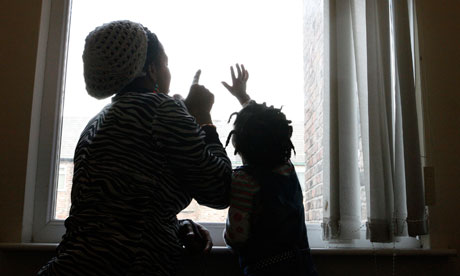
The first thought Binta Jobe has on waking each morning is of the day she was taken, aged nine, by family, into the bush and forced to undergo female genital mutilation (FGM). It was done without anaesthetic, by an old woman with no medical training. Now the 23-year-old Liverpool-based asylum seeker from the Gambia is fighting to save her three-year-old daughter, Aisha, from the same fate.
The World Health Organisation defines FGM as "all procedures that involve partial or total removal or injury of the external female genitalia for non-medical reasons". It estimates that up to 140 million females worldwide have experienced the procedure, including 92 million in Africa.
"I dream of blood," says Jobe, who suffers recurrent infections, sexual problems and pain as a result of the surgery. "It's an abuse. I just want Aisha to be able to grow up stronger than I am. We have no choice about it in our country. I did not understand that I had rights until I came to the UK."
Jobe arrived in the UK in 2008 to join her husband who had come to study. Within weeks of Aisha's birth, there was talk of arranging her circumcision. Jobe fled with her daughter. She applied for asylum in 2010, based on her belief that she and her daughter will be tracked down by extended family and Aisha subjected to FGM if they are forced to return to the Gambia.
FGM is still legal in the Gambia, where, according to Unicef, about 78% of the female population undergo the procedure. Under the UN 1951 Refugee Convention, fear of being forced into FGM is grounds for seeking asylum. It is also regarded by the UN as torture and as "inhuman and degrading". Yet the UK Border Agency (UKBA) refused Jobe's application for asylum and her last appeal was turned down in September 2012.
"After careful consideration, both we and the courts have ruled that [Jobe] is not in need of asylum. The court found [she] could live safely elsewhere in the Gambia and that the law provided sufficient protection for her and her daughter," says a UKBA spokesman.
The government launched the UK's first all-party parliamentary group on FGM in December 2011 to address FGM both here and abroad. FGM is illegal in the UK under the 2003 Female Genital Mutilation Act, as is sending UK residents abroad to undergo the procedure.
Jobe's case has been taken up by human rights lawyer, Peggy Layoo, who is applying for a judicial review. Layoo condemns UKBA's stance as "utter hypocrisy".
She says: "FGM is akin to rape, but it is not being taken seriously by UKBA. It is a denial of the suffering of women in the third world. We all know that FGM is going on, yet the government does not want to do anything about it."
A 2001 study estimated 66,000 African women in England and Wales had undergone FGM, and a further 23,000 girls under the age of 15 were at risk. Jobe's case is viewed by many of those working with asylum seekers as the tip of the iceberg.
Jobe's pupils dilate with fear at the prospect of returning to the Gambia. She was only 13 when she was married against her will to a family friend more than 20 years older than her. She cannot read or write. Young women like herself live in compounds in the Gambia with an extended family and she says a single woman arriving in this small country would stand out and be found by family who would punish her for going against her culture.
"If I go back to the Gambia I might as well just say, 'Here I am, come and take me.' It is a place of gossip and they will just track me down. I will just end up losing my child," Jobe says.
Sylvia Chant, professor of developmental geography at the London School of Economics and an expert on the Gambia, submitted a report as evidence to back Jobe's case. She agrees that Jobe would have few options – for example, prostitution – if she returned to the Gambia, that both she and Aisha would be extremely vulnerable to violent victimisation and neither would receive any state protection.
UKBA says the Gambia has begun making moves to change the culture around FGM, working with Gamcotrap, one of the oldest women's rights NGOs in the Gambia, and through local "dropping of the knife" ceremonies.
Lauren Butler, an immigration case worker at Rochdale Law Centre, is working on four asylum cases similar to Jobe's involving FGM. She thinks UKBA's decisions are often based on unreliable sources and are made from a middle-class, white perspective. "They are not apprehending the situation. It is something between wilful ignorance and cultural disbelief," she says.
UKBA states: "Female genital mutilation is an abhorrent crime, and we are working with international agencies to help prevent women and girls becoming victims."
But Maurice Wren, director of charity Asylum Aid, accuses the government of double standards. He says: "At a time when government is publicly promising action against FGM practised in the UK, it is appalling to think that women and girls who have claimed asylum here are being sent back to face exactly the same abuse overseas."
• Some names have been changed

